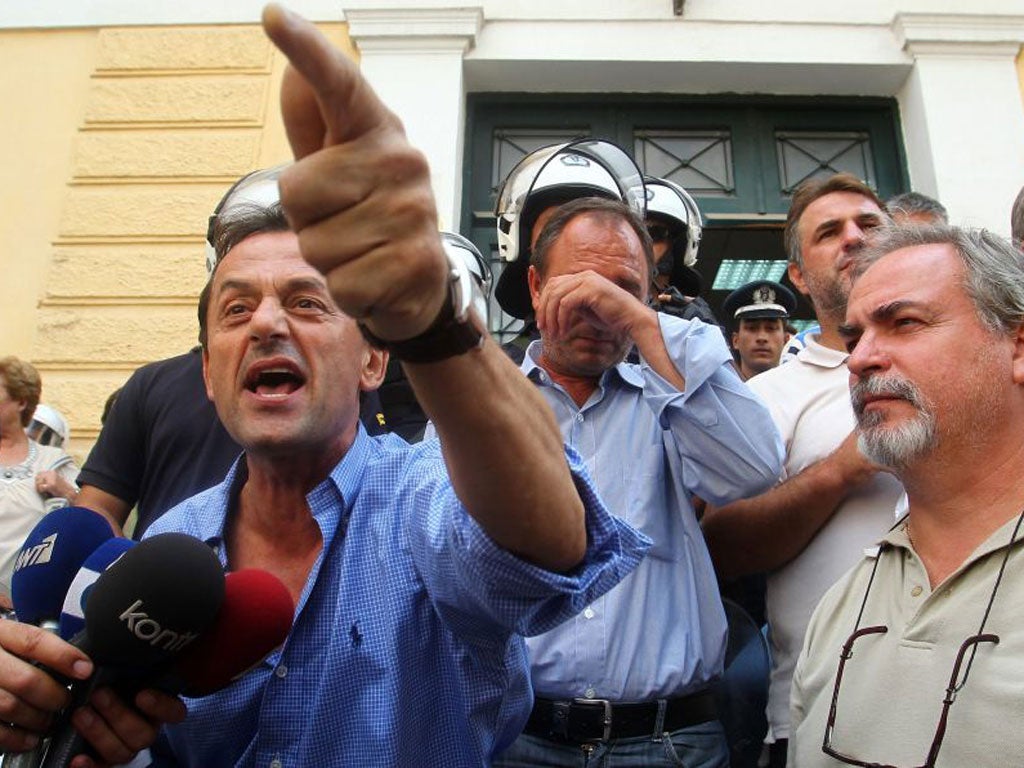We're going to run out of money next month, warns Greek leader

Your support helps us to tell the story
From reproductive rights to climate change to Big Tech, The Independent is on the ground when the story is developing. Whether it's investigating the financials of Elon Musk's pro-Trump PAC or producing our latest documentary, 'The A Word', which shines a light on the American women fighting for reproductive rights, we know how important it is to parse out the facts from the messaging.
At such a critical moment in US history, we need reporters on the ground. Your donation allows us to keep sending journalists to speak to both sides of the story.
The Independent is trusted by Americans across the entire political spectrum. And unlike many other quality news outlets, we choose not to lock Americans out of our reporting and analysis with paywalls. We believe quality journalism should be available to everyone, paid for by those who can afford it.
Your support makes all the difference.Greece's Prime Minister warned yesterday that his country's coffers would run dry by November unless international lenders disbursed a vital €31.5bn loan instalment soon.
Invoking a comparison with the Weimar Republic in Germany before the Second World War, Antonis Samaras also warned of "chaos" in Greece if his coalition government failed and democracy collapsed.
"The government is giving a fight on all sides for the credibility and salvation of this country so the people's sacrifices don't go to waste," Mr Samaras told reporters.
Athens and its debt inspectors are still trying to hash out new spending cuts to help speed up the release of the next round of bailout funds. Amid this uncertainty, Mr Samaras highlighted the consequences of a Greek exit from the euro, warning it would be "a total disaster" and could prove "very destabilising" for Europe.
Once one member country left, the international markets would probably target the next "weakest link". This would prove "painful for everybody and could prove fatal for many", he said.
Athens is grappling with the worst financial crisis of its modern history with one in four people out of a job and the country's recession predicted to continue for a sixth year.
In Athens, international lenders continue to delay the release of the loans. Gerry Rice, a spokesman from the International Monetary Fund, said the lending organisation would not hand out its portion of cash unless the viability of Greece's debt was gauged sustainable or other lenders filled a financing gap in the bailout.
In an interview published yesterday with the German newspaper Handelsblatt Mr Samaras warned that the cohesion of Greek society was being "endangered by rising unemployment, as was Germany towards the end of the Weimar Republic."
Such grim conditions are fertile ground for the rise of extremism. Support for the extreme-right Golden Dawn party has soared, and the Prime Minister warned in the interview that Greek democracy is "facing perhaps its greatest challenge". Society, he went on, was threatened by the extreme left-wing populists and "the rise of a right-wing extremist, one might say fascist, neo-Nazi party."
"People know that this government means Greece's last chance," Mr Samaras said. "We will make it. If we fail, chaos awaits us." He also outlined solutions, including the recapitalisation of Greece's banks directly from a European fund to avoid further debt piling onto the country.
"The European Central Bank, which owns Greek government debt, could declare itself happy with lower interest... or agree to a rollover when these bonds are due," he said. So far, EU officials have adamantly rejected this.
A German government spokesman announced yesterday that Chancellor Angela Merkel would go to Athens on Monday to show support for the reform efforts. But many Greeks blame Germany's insistence on austerity for their hardship, and the left-wing Syriza party has urged unions to protest against the German leader. "Workers, pensioners and unemployed people can take no more of the EU's punitive policies,"union leaders said.
But a German statement stressed that it wants Greece to stay in the euro bloc, albeit while pushing ahead with painful reforms. Since Greece received its first bailout in May 2010, it has repeatedly slashed incomes, increased taxes and raised retirement ages.
Join our commenting forum
Join thought-provoking conversations, follow other Independent readers and see their replies
Comments